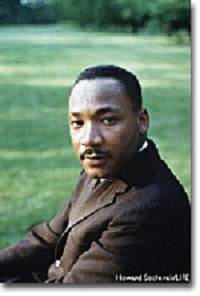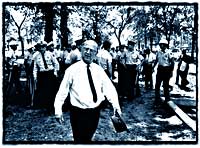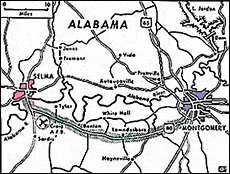54f. Martin Luther King Jr.

As the leader of the nonviolent Civil Rights Movement of the 1950s and 1960s, Martin Luther King Jr. traversed the country in his quest for freedom. His involvement in the movement began during the bus boycotts of 1955 and was ended by an assassin's bullet in 1968.
As the unquestioned leader of the peaceful Civil Rights Movement in the 1960s, Dr. Martin Luther King Jr. was at the same time one of the most beloved and one of the most hated men of his time. From his involvement in the Montgomery bus boycott in 1955 until his untimely death in 1968, King's message of change through peaceful means added to the movement's numbers and gave it its moral strength. The legacy of Martin Luther King Jr. is embodied in these two simple words: equality and nonviolence.
King was raised in an activist family. His father was deeply influenced by Marcus Garvey's Back to Africa Movement in the 1920s. His mother was the daughter of one of Atlanta's most influential African American ministers. As a student, King excelled. He easily moved through grade levels and entered Morehouse College, his father's alma mater, at the age of fifteen. Next, he attended Crozer Theological Seminary, where he received a Bachelor of Divinity degree. While he was pursuing his doctorate at Boston University, he met and married Coretta Scott. After receiving his Ph.D. in 1955, King accepted an appointment to the Dexter Street Baptist Church in Montgomery, Alabama.

Birmingham, Alabama, police commissioner Bull Connor ordered that fire hoses and dogs be used to subdue protesters. The violence that ensued was broadcast across the nation galvanized the Civil Rights Movement.
After his organization of the bus boycott, King formed the Southern Christian Leadership Conference, which dedicated itself to the advancement of rights for African Americans. In April 1963, King organized a protest in Birmingham, Alabama, a city King called "the most thoroughly segregated city in the United States." Since the end of World War II, there had been 60 unsolved bombings of African American churches and homes.
Boycotts, sit-ins and marches were conducted. When Bull Connor, head of the Birmingham police department, used fire hoses and dogs on the demonstrators, millions saw the images on television. King was arrested. But support came from around the nation and the world for King and his family. Later in 1963, he delivered his famous "I Have a Dream" speech to thousands in Washington, D.C.

In March 1965, Dr. King led protestors on a 50-mile, voting-rights march from Selma to Montgomery, Alabama. It took three attempts for the protestors to complete the march, battling tear gas, cattle prods, and police batons, but the national attention drawn by their efforts ultimately led to the Voting Rights Act of 1965.
After the passage of the Civil Rights Act of 1964, King turned his efforts to registering African American voters in the South. In 1965, he led a march in Selma, Alabama, to increase the percentage of African American voters in Alabama. Again, King was arrested. Again, the marchers faced attacks by the police. Tear gas, cattle prods, and billy clubs fell on the peaceful demonstrators. Public opinion weighed predominantly on the side of King and the protesters. Finally, President Johnson ordered the National Guard to protect the demonstrators from attack, and King was able to complete the long march from Selma to the state capital of Montgomery. The action in Selma led to the passage of the Voting Rights Act of 1965.
Early in the morning of April 4, 1968, King was shot by James Earl Ray. Spontaneous violence spread through urban areas as mourners unleashed their rage at the loss of their leader. Rioting burst forth in many American cities.
RFK on MLK
The day Martin Luther King Jr. was assassinated, Robert F. Kennedy was campaigning for the presidency in Indianapolis, Indiana. Kennedy made this speech in remembrance of Dr. King's tireless efforts.
I have bad news for you, for all of our fellow citizens, and people who love peace all over the world, and that is that Martin Luther King was shot and killed tonight.
Martin Luther King dedicated his life to love and to justice for his fellow human beings, and he died because of that effort.
In this difficult day, in this difficult time for the United States, it is perhaps well to ask what kind of a nation we are and what direction we want to move in. For those of you who are black — considering the evidence there evidently is that there were white people who were responsible — you can be filled with bitterness, with hatred, and a desire for revenge. We can move in that direction as a country, in great polarization — black people amongst black, white people amongst white, filled with hatred toward one another.
Or we can make an effort, as Martin Luther King did, to understand and to comprehend, and to replace that violence, that stain of bloodshed that has spread across our land, with an effort to understand with compassion and love.
For those of you who are black and are tempted to be filled with hatred and distrust at the injustice of such an act, against all white people, I can only say that I feel in my own heart the same kind of feeling. I had a member of my family killed, but he was killed by a white man. But we have to make an effort in the United States, we have to make an effort to understand, to go beyond these rather difficult times.
My favorite poet was Aeschylus. He wrote: "In our sleep, pain which cannot forget falls drop by drop upon the heart until, in our own despair, against our will, comes wisdom through the awful grace of God."
What we need in the United States is not division; what we need in the United States is not hatred; what we need in the United States is not violence or lawlessness; but love and wisdom, and compassion toward one another, and a feeling of justice toward those who still suffer within our country, whether they be white or they be black.
So I shall ask you tonight to return home, to say a prayer for the family of Martin Luther King, that's true, but more importantly to say a prayer for our own country, which all of us love — a prayer for understanding and that compassion of which I spoke.
We can do well in this country. We will have difficult times; we've had difficult times in the past; we will have difficult times in the future. It is not the end of violence; it is not the end of lawlessness; it is not the end of disorder.
But the vast majority of white people and the vast majority of black people in this country want to live together, want to improve the quality of our life, and want justice for all human beings who abide in our land.
Let us dedicate to ourselves to what the Greeks wrote so many years ago: to tame the savageness of man and make gentle the life of this world.
Let us dedicate ourselves to that, and say a prayer for our country and for our people.
Click for more on RFK and MLK!
But the world never forgot his contributions. Time magazine had named him "Man of the Year" in 1963. In 1964, he won the Nobel Peace Prize and was described as "the first person in the Western world to have shown us that a struggle can be waged without violence." In 1977, he was posthumously awarded the Presidential Medal of Freedom, the highest award a civilian American can earn. In the 1980s, his birthday became a national holiday, creating an annual opportunity for Americans to reflect on the two values he dedicated his life to advancing: equality and nonviolence.







